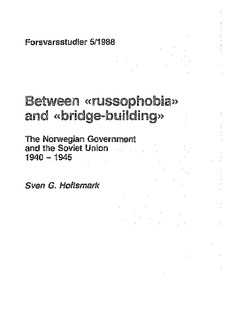| dc.contributor.author | Holtsmark, Sven G. | |
| dc.date.accessioned | 2011-10-05T14:21:07Z | |
| dc.date.available | 2011-10-05T14:21:07Z | |
| dc.date.issued | 1988 | |
| dc.identifier.issn | 0333-3981 | |
| dc.identifier.uri | http://hdl.handle.net/11250/99453 | |
| dc.description | Strong elements of traditional Scandinavian "russophobia" continued to influence the evolution of Norwegian-Soviet relations during the second world war, even when the Norwegian government gradually redirected its official foreign policy doctrine from strong commitments to North Atlantic military cooperation towards a doctrine of "bridge-building" might be expected to have influenced Norway's relations with the Soviet Union. one of the aims of this study is to give a general presentation of Norwegian-Soviet relations during the war. On this background the study further examines how the redirectioning of Norway's foreign policy line made itself felt in the various fields of Norwegian-Soviet relations. The study tends to emphasize the continued presence of a skeptical attitude towards the Soviet Union in Norwegian government circles. This factor made itself felt when the two countries set out to lay the foundations of war-time cooperation, and also influenced Norwegian long-term foreign policy and security planning. | en_US |
| dc.language.iso | eng | en_US |
| dc.publisher | Institutt for forsvarsstudier | en_US |
| dc.relation.ispartofseries | Forsvarsstudier; 5 | |
| dc.title | Between "russophobia" and "bridge-building": The Norwegian Government and the Soviet Union 1940-1945 | en_US |
| dc.type | Others | en_US |
| dc.source.pagenumber | 77 s. | en_US |
